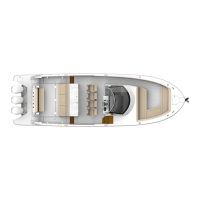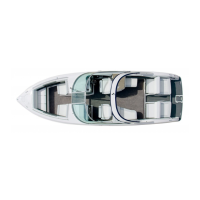Do you have a question about the Regal 3550 and is the answer not in the manual?
The company's core principles and commitment to customer satisfaction.
Guidance on operating and maintaining your Regal boat safely and with pleasure.
Contains important equipment literature, vendor, and warranty information for quick reference.
Covers Hull Identification Number (HIN), NMMA certification, and vessel details.
Instructions for filling out float plans and understanding yacht certification plates.
Outlines dealer duties, owner's duties, and warranty registration.
Details the lifetime plus limited structural and hull blister warranties provided by Regal.
Explains warning, caution, and danger labels used to identify safety-related items.
Provides essential advice on safe boating, weather checks, and vessel condition.
Details mandatory safety gear, including personal flotation devices (PFDs).
Covers PFD maintenance, fire extinguisher types, and minimum requirements for boats.
Explains visual distress signals and types of pyrotechnic and non-pyrotechnic devices.
Covers sound signals, radio use, navigation lights, garbage disposal, EBIRBs, and life rafts.
Addresses exhaust hazards, alcohol effects, boating accidents, and weather conditions.
Explains the fundamental rules for avoiding collisions, including right-of-way.
Details the use of buoys, beacons, and charts for safe navigation.
Provides guidance on operating at night and safely navigating under bridges.
Covers engine mounts, alignment, removal, ventilation, and propulsion systems.
Details propeller maintenance, controls, and dashboard instrumentation for monitoring.
Explains the function and reading of various gauges like tachometer, oil pressure, and fuel level.
Guides on using the remote control for throttle, gear shifting, and trim functions.
Explains the use of DC and AC power on board and basic electrical principles.
Details battery charging, isolation, distribution, and circuit protection for the DC system.
Covers operation of dash components like blowers, ignition, stereo, and cabin utilities.
Explains AC power sources, shore power connection, GFCI outlets, and generator operation.
Covers fuel tank components, vents, filters, and distribution for gasoline and diesel systems.
Details steering system operation, power trim, and trim tab functionality for boat balance.
Explains the operation of fresh water, waste water, vacuflush heads, and shower sump pumps.
Covers pre-departure questionnaires, underway checks, and fueling safety.
Provides guidance on dock lines, fenders, docking steps, stern drive maneuvering, and anchoring.
Details actions for emergencies like fire, first aid, CPR, hypothermia, and environmental awareness.
Covers air conditioning, CO detectors, water/waste systems, refrigerator, and vacuflush heads.
Explains operation of windlass, lights, wipers, compass, cabin door, helm seat, and swim platform.
Guides on operating the depth sounder and setting up the boat's canvas enclosure.
Covers bilge pump operation, engine/generator access, battery maintenance, and sump system components.
Instructions for safe use of the swim platform and ladder, including warnings.
Details cleaning procedures for upholstery, carpet, plastics, interior fabrics, Corian, and appliances.
Covers maintenance of windlass, deck hardware, trim tabs, steering, propellers, and hull bottom.
Provides a detailed chart for routine maintenance of various boat components and systems.
Introduces diagnostic charts for identifying common mechanical, electrical, and fuel problems.
Offers solutions for issues with remote controls and their associated cables and boxes.
Provides diagnostic steps for gauges showing no reading or incorrect readings.
Addresses common causes and fixes for engine starting or running issues related to the fuel system.
Covers diagnostic steps for excessive vibration and poor boat performance.
Provides troubleshooting guidance for DC and AC electrical issues, including power and equipment failures.
Addresses common problems in the fresh water system, such as air in the system and low pressure.
Offers solutions for issues with vacuflush heads, including leaks, overflows, and flushing problems.
Provides diagnostic steps for common air conditioner faults, like not starting or poor cooling.
Offers diagnostic steps for refrigerators not cooling, not running on DC, or not running on AC.
Provides troubleshooting for DVD players and televisions, covering sound, picture, and remote control issues.
Outlines general storage procedures, introduction to winterization, and decommissioning checklists.
Details specific winterization steps for fresh water, waste, and air conditioning systems.
A list of nautical terms useful in everyday boating communications and terminology.
Provides technical data, specifications, and dealer contact information.
Illustrates typical label placements and vacuflush/plumbing system layouts for the boat.
Includes drawings for deck hardware, electrical harness routing, and dash component assembly.

